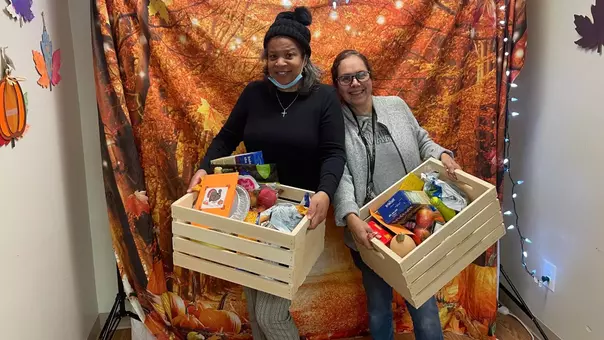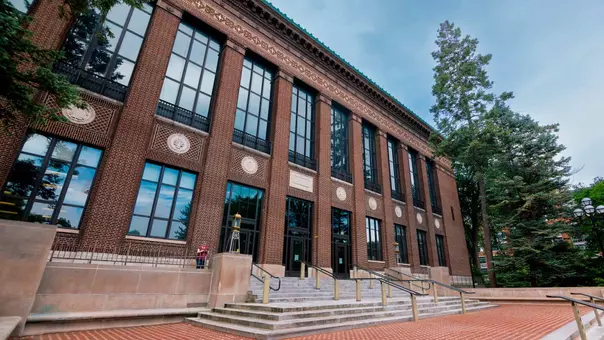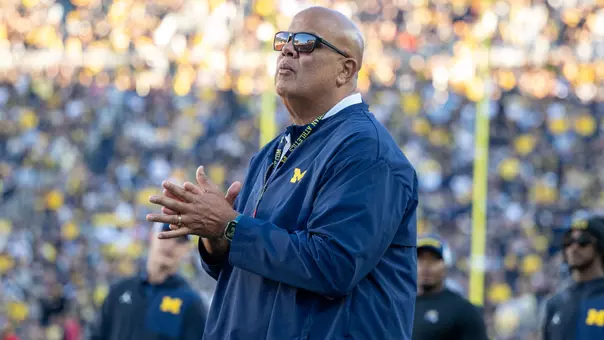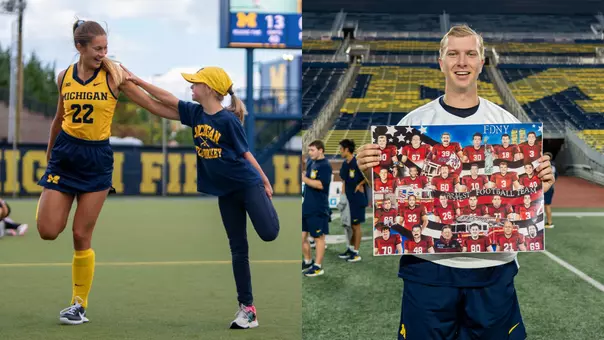
Future Friday: A Conversation with Jim Hackett
8/28/2015 12:00:00 AM | General
Aug. 28, 2015

Jim Hackett
Jim Hackett's office is located on top of a historical gold mine.
It's fitting, then, that his second-story office at Weidenbach Hall overlooks the corner of State and Hoover, a mere few feet from where the iconic Ferry Field gate once stood as a bridge between the University of Michigan and its athletic department.
This year marks the 150th year of existence for U-M Athletics. Here, on this very land, sports have been grown. Championships have been won. Facilities have been built, moved, renovated and otherwise torn down. Thousands of men and women, some of whom created legacies that stand to this day, have walked the same halls of the same buildings that Hackett oversees on a daily basis.
As Michigan's interim director of athletics, Hackett must choose his words carefully, even when discussing the past, present and future of the athletic department he currently runs.
On this late Friday afternoon, Hackett swivels around in his chair and looks down at that intersection below.
"I'm surprised," he says. "There's few things in life that get to last 150 years that have people tied to it. You can make a list and cross off the things that don't make it -- companies, countries, architecture. For an athletic department to function within a university for that long, it's a great endorsement for how powerful it is. It's something that can last.
"I didn't think about that when I walked into this interim role. But now I marvel at that."
* * * * *
MGoBlue.com recently sat down with Hackett to discuss the athletic department's 150th anniversary celebration, which officially began earlier this month. This year, every varsity team will have one home event designated as a special 150 event, starting with football's home opener on Sept. 12 vs. Oregon State.
MGoBlue: There's a lot of history to choose from, but what are some of the milestones in our department's history that are most memorable to you?
Hackett: One that really comes to mind is football beating Ohio State in Columbus in 1996 when OSU was ranked No. 2. It was a really cold day and I was in a terrible seat, but we dominated that game. To hear that stadium be quiet, it was unbelievable to see us come in and own that. Another is certainly our national title in men's basketball in 1989. Softball winning the national title in 2005, that was a time when I fell in love with the sport. I taped all those games. I was running a big company and wasn't around much, but once I watched the first game, I wanted to watch the whole series. I found out there were a lot of people like me. With its run to the Women's College World Series this past spring and all the records in viewership that it broke, the sport has redefined its attractiveness. And then finally our Olympic performers and seeing what those men and women have done on the world stage. It's extraordinary.
MGoBlue: Talk about the relationship that this athletic department has with the university as a whole. Why is it so important?
Hackett: The combination of world-class academics and the contest of sport are a leveraged experience. Either one of them would stand on their own. If you come here and have a great academic experience and a great athletic experience, there's just nothing like it in the country. Nothing like it.
What's a typical athletic contest like? It's higher rated. More people watch it. They're surprised when we lose. Now, we won't win everything, but that's why it's so effective.
And for academics, you sort of become mesmerized when you start to understand the who's who. We've got a number of astronauts. A former President. You marvel at the number of people who have been here that may have been unsung in their days on campus but then go on to achieve so much in life. The connection, it's a powerful thing.
MGoBlue: A big part of this 150th anniversary is not only looking our history but where we see ourselves going. In speaking about the future, what are some of the changes you could see being implemented?
Hackett: The great thing about the future is that we see ourselves in it. You can predict some of it because of our physiology. Athletics are so deeply rooted in that -- strength, speed, capacity -- but it can also be expressed in a lot of ways. Think of objects. The technology around a baseball bat or a football or a tennis racquet has changed so much in 150 years. Back then, they couldn't have believed that a football could have been thrown as far as it could today, or a baseball could be hit as far as it could today. A lot of it is in the material science, and in training and nutrition, and how all of those things change over time.
But a big predictor, I think, is information. For the observer of the sport, the reason they came to a game is because if they didn't, they had to wait to read it in the newspaper. That lag factor meant the on-site experience had a higher priority. Today, you can get an instantaneous representation of what's going on in the game. With television and live streaming, it's just more intense. We have to figure out a way, in our future, to make the in-game atmosphere and experience better and more enjoyable. What's so valuable to see in-person that you'd be willing to drive two hours in each direction? The reason you don't is because you can see the same thing on television. Now the question we have to raise is, what does that fan learn here, what does that fan experience here that they can't back at home? There's all kinds of technologies that can be brought to bear.
MGoBlue: What about college athletics as a whole?
Hackett: Jim [Harbaugh] has some great insight on this. Over time, something goes up in value and something goes down. We can make tennis shoes, airplanes and cars better today than we could 150 years ago, mostly because of material science, production, robotics, etc. That's a certainty. We never stop innovating. Sometimes, we don't evolve fast enough.
Here's an example. Why weren't there enough women's restrooms in college stadiums? It's because many of the stadiums were designed at the turn of the century and the gender difference in attendance was heavily tilted. As equity set in and more women came to games, we were undersized in terms of restrooms. But which is the problem? Our ability to make restrooms? No. It was misunderstanding of use. The things you used to value, you may not need anymore. We have waste here because we've lost track of what users want, and in doing that, we're continuing to pay for something that used to have value that doesn't anymore. What things are inside of the university or inside of college athletics that don't match what the athletes need? Could we reallocate those dollars? There's some potential in that, but it's very difficult. It's something we're constantly evaluating.
MGoBlue: You've got one hour for lunch and three seats at your table. Whom do you invite?
Hackett: There are so many great ones. Bo (Schembechler) would have to be one. To have another lunch with him, for any reason, is right up there. President (Gerald R.) Ford would be the second one. I got to know him fairly well. You can imagine that pairing. The third one is probably a toss-up between Desmond (Howard) and Charles (Woodson). I can't pick either of them. I was able to witness them as a fan and see how they could change the game.
MGoBlue: Lastly, talk about the relationship that Michigan has with its surrounding community.
Hackett: The University of Michigan is a global symbol, and it's largely because of our 550,000 alums. They remember the significant athletic contests that they're really proud of. They didn't have to play in it, but they were proud of their university for being in it. President Ford felt that way. Now I'm meeting with kids 40 years after I played that feel the same way. What is it that persists over time? It's the spirit of "This Michgian of Ours," the thing that brings you to the centered place of why this is so powerful.
The 2015-16 academic year marks the 150th anniversary of Michigan Athletics. We invite the University of Michigan family to celebrate the passion that fuels us, rediscover the stories and traditions that unite us, and imagine what the future holds for us. We look forward to celebrating "This Michigan of Ours." To share a memory of Michigan Athletics, please fill out our online form or email goblue150@umich.edu.










